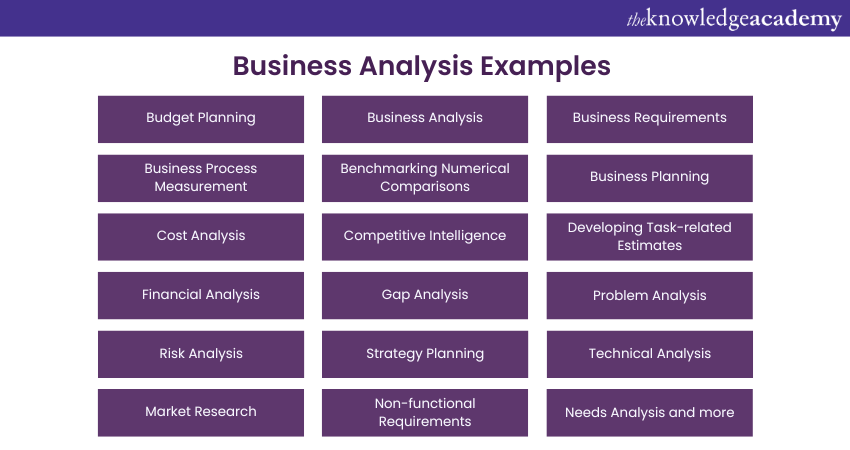We may not have the course you’re looking for. If you enquire or give us a call on 01344203999 and speak to our training experts, we may still be able to help with your training requirements.
Training Outcomes Within Your Budget!
We ensure quality, budget-alignment, and timely delivery by our expert instructors.

Business Analysis plays a pivotal role in shaping the strategies and operations of modern organisations. This blog discusses various Business Analysis Examples to help you understand the scope of Business Analysis and why it is essential for modern-day organisations.
The primary goal of Business Analysis is to help organisations improve their efficiency and effectiveness, increase profitability, and achieve their strategic objectives. Business Analysts use various Business Analysis Tools and techniques, including data analysis, process modelling, stakeholder analysis and risk assessment, to accomplish their goals.
According to an analysis by the International Institute of Business Analysis (IIBA), individuals with the Certified Business Analysis Professional (CBAP) designation earn an average of 19% higher salary than non-certified Business Analysts. Further, in this blog, we will discuss real-world examples of Business Analysis in action, successful across various industries and domains.
Table of Contents
1) Understanding Business Analysis
2) Business Analysis Examples
3) Importance of Business Analysis
4) Roles and Responsibilities of a Business Analysis
5) Conclusion
Understanding Business Analysis
Business Analysis involves identifying business needs and recommending solutions to address them. It involves a systematic approach to understanding business processes, identifying problems or opportunities for improvement, and recommending changes to enhance the organisation's performance.
It is used in various settings, including software development, Project Management, process improvement, and organisational change management. Business analysis techniques can also help you understand more about the business world Business Analysts work closely with stakeholders across the organisation, including Business Leaders, IT Professionals, Project Managers, and other key stakeholders.

However, the role of a Business Analyst can vary depending on the organisation and the specific project they are working on. However, some common responsibilities of a Business Analyst include gathering and documenting requirements, analysing business processes, developing business cases, managing stakeholders, facilitating communication, testing and validating solutions, supporting project management, and continuous improvement.

Business Analysis Examples
Now, let us discuss and analyse the Business Analysis Examples in two contexts: Common Examples and Real-life Examples.
Common Examples
Following is a list of a few common examples of Business Analysis mentioned in the image below.

These common examples mentioned in the image above are used in Business Analysis to test information regarding a business or functions related to enterprises.
Dive into the Detailed Case Study of Business Analysis.
Real-life Examples
Let us take a few real-life Business Analysis examples of a few renowned organisations:
Amazon:
Amazon’s online store can prove to be a fantastic example because it has used Business Analytics amazingly. It analyses the client database using the business model and statistical methods and then provides customised product suggestions to its audience.
Also, in-depth data analysis is done to create profitable company plans that enable supply chain management to run smoothly.
Get ready for your interview with our top Business Analyst Interview Questions.
Microsoft:
Microsoft discovered in 2015 that more in-person communication with its employees was necessary to improve the organisation's performance. Hence, the MS Workplace Analytics team decreased the number of offices from 5 to 4 to minimise the travel time required for meetings. Each week, this method saved around 100 hours of labour. Finally, Microsoft saved about 520,000 USD in net employee time every year.
Uber:
Uber used Business Analytics in 2018 to enhance Customer Obsession Ticket Assistant (COTA), a tool built on machine learning and a natural language processing platform for customer assistance. It enables agents to respond to support tickets more accurately and swiftly. After the initial iteration, they saw a 10% reduction in ticket resolution time. Uber eventually created COTA v2. As a result, the deep learning architecture garnered more attention.
Obtain a BCS Certificate in Business Analysis Practice to improve your understanding of Business Analysis techniques and skills. Register today!
Importance of Business Analysis
Business Analysis plays a crucial role in businesses because it supports decision-making and helps to pinpoint and resolve business issues, improving processes. The following are some key reasons to understand the significance of Business Analysis:
Identifying and solving business problems: Business Analysis helps identify business problems and determine the root causes, enabling organisations to develop effective solutions to address these problems.
Improving processes: Business Analysis can help organisations to identify inefficient processes and develop more effective ones. This can result in enhanced productivity, reduced costs, and increased customer satisfaction.
Supporting decision-making: Business Analysis provides valuable insights into business performance, enabling organisations to make informed decisions. It includes identifying trends, forecasting future performance, and assessing the impact of different options.
Facilitating communication and collaboration: Business Analysis helps communicate between different organisational stakeholders. It incorporates business leaders, IT professionals, and other departments, ensuring everyone is aligned and working towards common goals.
Enhancing project success: Business Analysis plays a critical role in ensuring the success of projects. By identifying requirements, managing stakeholder expectations, and ensuring that solutions are aligned with business objectives, Business Analysis helps to deliver projects that meet the organisation's needs.
Are you committed to enhancing your career in Business Analysis? Then, acquiring a BCS International Diploma in Business Analysis certification will boost your career prospects. Sign up now!
Roles and Responsibilities of a Business Analysis
Business Analyst roles and responsibilities can vary depending on the organisation and the specific project they are working on. However, here are some responsibilities that a Business Analyst may have:
Gathering and documenting requirements: Business Analysts are responsible for identifying and documenting business requirements, ensuring that they are clear, complete, and accurately reflect the organisation's needs.
Analysing business processes: Business Process Analysis, analyse and identify improvement areas, and make recommendations for process optimisation. Moreover, Business Process Analysis involves collaborating with stakeholders, including employees, managers, and other relevant parties, to gather valuable input and perspectives. This collaborative approach ensures a comprehensive understanding of the operational domain and facilitates the development of well-informed recommendations.
Developing business cases: These analysts develop business cases, assess proposed solutions' feasibility and present recommendations to stakeholders.
Managing stakeholders: They manage stakeholders, building relationships and ensuring they are engaged throughout the project lifecycle.
Facilitating communication: They facilitate communication between stakeholders, ensuring everyone is aligned and working towards common goals.
Testing and validating solutions: Business Analysts are responsible for testing and validating solutions to ensure they meet the organisation's needs and are aligned with business objectives.
Supporting project management: They provide input on project planning, risk management, and other project-related activities.
Continuous improvement: Business Analysts play a critical role in continuous improvement, identifying opportunities for improvement and making recommendations for process optimisation.
Explore the Key Roles and Responsibilities of a Business Analyst Today!
Conclusion
Reading this blog, we get introduced to several Business Analysis Examples. This helps us understand that by leveraging Business Analysis, organisations can achieve their goals, improve their performance, and gain a competitive advantage in their industries.
Are you interested in improving your skills and techniques relevant to your business operations? Then, register now with our Business Analysis Training courses to enhance your skill set.
Frequently Asked Questions
Upcoming Business Analysis Resources Batches & Dates
Date
 BCS Certificate in Business Analysis Practice
BCS Certificate in Business Analysis Practice
Mon 28th Oct 2024
Sat 2nd Nov 2024
Mon 25th Nov 2024
Mon 9th Dec 2024
Mon 6th Jan 2025
Mon 20th Jan 2025
Mon 3rd Feb 2025
Mon 17th Feb 2025
Mon 3rd Mar 2025
Mon 17th Mar 2025
Mon 7th Apr 2025
Mon 12th May 2025
Mon 9th Jun 2025
Mon 7th Jul 2025
Mon 4th Aug 2025
Mon 1st Sep 2025
Mon 6th Oct 2025
Mon 20th Oct 2025
Mon 3rd Nov 2025
Mon 17th Nov 2025
Mon 1st Dec 2025
Mon 15th Dec 2025







 Top Rated Course
Top Rated Course


 If you wish to make any changes to your course, please
If you wish to make any changes to your course, please


